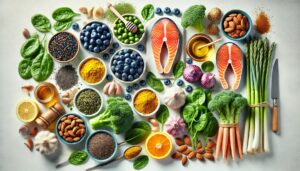In recent years, functional foods have gained significant attention as a natural way to improve health and prevent diseases. Functional foods are not just about providing basic nutrition; they offer additional health benefits that support the body’s systems and help reduce the risk of chronic conditions. In this guide, we’ll explore what functional foods are, their benefits, and how to incorporate them into your diet to enhance overall wellness.
What Are Functional Foods?
Functional foods are foods that offer more than just basic nutritional value. They are enriched with bioactive compounds, vitamins, minerals, or probiotics that actively contribute to health improvement and disease prevention.
Categories of Functional Foods
1. Naturally Functional Foods
These are whole foods that naturally contain beneficial compounds, such as:
• Fruits (rich in antioxidants, vitamins, and fiber)
• Vegetables (packed with phytonutrients and minerals)
• Nuts and seeds (loaded with healthy fats and proteins)
2. Fortified or Enhanced Foods
These are foods with added nutrients or compounds to enhance their health benefits, such as:
• Yogurts fortified with probiotics
• Milk with added calcium and vitamin D
• Cereals enriched with fiber or omega-3 fatty acids
How Do Functional Foods Work?
Functional foods work by delivering bioactive compounds that influence the body’s systems. For example:
• Probiotics in yogurt improve gut health.
• Omega-3 fatty acids in fish reduce inflammation and promote heart health.
• Antioxidants in fruits and vegetables combat oxidative stress.
Health Benefits of Functional Foods
1. Supporting Digestive Health
• Probiotics and Prebiotics: Found in yogurt, kefir, and fiber-rich foods, these compounds maintain a healthy gut microbiota, improving digestion and boosting immunity.
• Soluble Fiber: Found in oats, legumes, and flaxseeds, it helps regulate bowel movements and supports gut health.
2. Boosting Immunity
• Vitamin C: Citrus fruits and strawberries are rich in vitamin C, which strengthens the immune system and reduces the duration of colds.
• Zinc: Found in fortified cereals and seeds, zinc helps the body fight off infections.
3. Reducing the Risk of Chronic Diseases
• Heart Disease: Omega-3 fatty acids in fatty fish and flaxseeds help lower blood pressure and reduce cholesterol levels.
• Diabetes: Foods like whole grains and legumes, rich in fiber, help regulate blood sugar levels.
4. Enhancing Brain Function
• Omega-3 Fatty Acids: Found in fish and walnuts, omega-3s are crucial for brain health and may help prevent cognitive decline.
• Polyphenols: Found in green tea, dark chocolate, and berries, polyphenols protect against neurodegeneration and improve memory.
5. Supporting Bone Health
• Calcium and Vitamin D: Found in fortified milk, yogurt, and leafy greens, these nutrients are essential for strong bones and preventing osteoporosis.
6. Promoting Skin Health
• Antioxidants: Foods like tomatoes, carrots, and sweet potatoes are rich in antioxidants like beta-carotene, which protect the skin from sun damage.
• Collagen Boosters: Functional foods like bone broth and vitamin C-rich fruits support collagen production for healthier skin.
Top Functional Foods to Include in Your Diet
1. Probiotic-Rich Foods
• Yogurt: Provides live active cultures that improve gut health.
• Kefir: A fermented milk drink that combines probiotics and nutrients.
2. Omega-3 Rich Foods
• Salmon and Mackerel: Excellent sources of EPA and DHA for heart and brain health.
• Flaxseeds and Chia Seeds: Plant-based omega-3 sources for vegetarians.
3. Antioxidant-Packed Foods
• Berries: Rich in anthocyanins that fight inflammation and oxidative stress.
• Green Tea: Contains catechins that support metabolism and immunity.
4. Fiber-Rich Foods
• Oats: Help reduce cholesterol and stabilize blood sugar levels.
• Legumes: Provide both soluble and insoluble fiber, promoting digestive health.
5. Fortified Foods
• Milk with Vitamin D: Supports calcium absorption for stronger bones.
• Cereals with Iron: Help prevent anemia and boost energy levels.
6. Plant-Based Superfoods
• Spirulina: A nutrient-dense algae rich in protein, B vitamins, and iron.
• Turmeric: Contains curcumin, which has powerful anti-inflammatory properties.
How to Incorporate Functional Foods Into Your Diet
1. Start Your Day with Functional Breakfast Options
• Add chia seeds or flaxseeds to your smoothie or yogurt.
• Choose fortified cereals or whole-grain bread with added nutrients.
2. Add Variety to Your Meals
• Incorporate colorful vegetables into your salads for a boost of antioxidants.
• Replace refined grains with whole grains like quinoa or brown rice.
3. Use Functional Snacks
• Swap chips for nuts, seeds, or dried fruits.
• Snack on a piece of dark chocolate (at least 70% cocoa) for its polyphenols.
4. Opt for Fortified Products
• Use fortified plant-based milk (e.g., almond or soy milk) as a dairy alternative.
• Incorporate vitamin D-enriched orange juice into your diet.
5. Cook with Superfoods
• Use turmeric in soups, curries, or teas for its anti-inflammatory benefits.
• Add spirulina powder to smoothies for a nutritional boost.
Functional Foods and Disease Prevention
1. Cardiovascular Health
Omega-3 fatty acids reduce triglycerides and prevent arterial plaque buildup. A diet rich in nuts, seeds, and fatty fish lowers the risk of heart attacks and strokes.
2. Diabetes Management
Functional foods like whole grains and legumes slow sugar absorption, keeping blood sugar levels stable. Cinnamon is also known for its ability to improve insulin sensitivity.
3. Cancer Prevention
Cruciferous vegetables (e.g., broccoli, cauliflower) contain compounds like sulforaphane, which may reduce the risk of certain cancers. Green tea polyphenols are also being studied for their anticancer properties.
4. Gut Health Disorders
Probiotic foods like yogurt and prebiotic-rich foods like bananas improve digestion, alleviate constipation, and manage IBS symptoms.
Potential Risks and Precautions
While functional foods offer many benefits, it’s essential to consume them in moderation. Overconsumption of certain nutrients can lead to imbalances or side effects. For instance:
• Excess Omega-3s: May cause blood thinning.
• High Fiber Intake: Can lead to bloating or gas if not introduced gradually.
Always consult with a healthcare professional or dietitian to tailor your functional food intake to your individual needs.
The Future of Functional Foods
The demand for functional foods is growing as consumers prioritize preventive healthcare and wellness. Innovations like personalized nutrition, which tailors functional food recommendations based on genetic makeup, are paving the way for a healthier future.
Emerging trends include:
• Gut Health Focused Products: Expansion of prebiotic and probiotic-enhanced foods.
• Plant-Based Functional Foods: Growing popularity of algae, mushrooms, and plant proteins.
• Sustainable Functional Foods: Foods made with environmentally friendly practices and ingredients.
Conclusion: Harness the Power of Functional Foods
Functional foods are a simple yet powerful way to enhance your health through diet. By incorporating nutrient-rich, bioactive foods into your meals, you can support your digestive system, boost immunity, and prevent chronic diseases. Start small by adding a few functional foods to your daily routine and experience the transformative impact they can have on your overall wellness.
Take the first step today—your body will thank you!
Read more about Superfood Recommendations: Top Foods to Boost Your Immune System




















